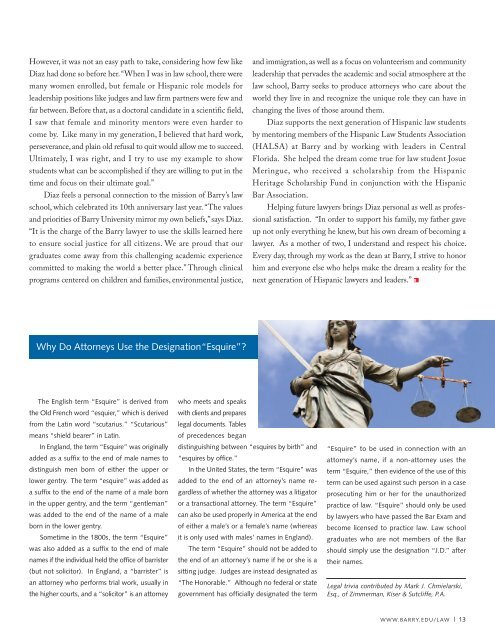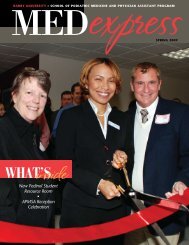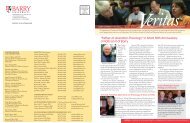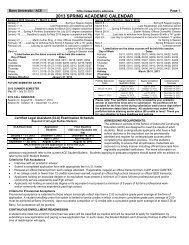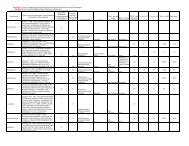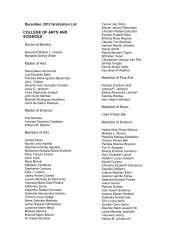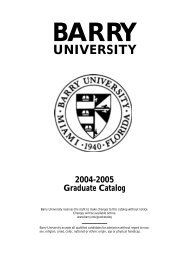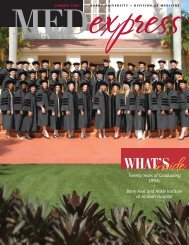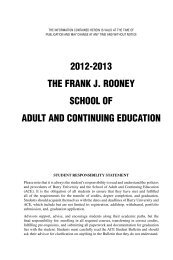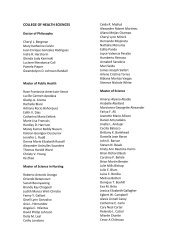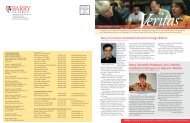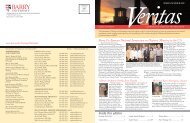BARRY LAWMAGAZINE - Barry University
BARRY LAWMAGAZINE - Barry University
BARRY LAWMAGAZINE - Barry University
Create successful ePaper yourself
Turn your PDF publications into a flip-book with our unique Google optimized e-Paper software.
However, it was not an easy path to take, considering how few like<br />
Diaz had done so before her.“When I was in law school, there were<br />
many women enrolled, but female or Hispanic role models for<br />
leadership positions like judges and law firm partners were few and<br />
far between. Before that, as a doctoral candidate in a scientific field,<br />
I saw that female and minority mentors were even harder to<br />
come by. Like many in my generation, I believed that hard work,<br />
perseverance,and plain old refusal to quit would allow me to succeed.<br />
Ultimately, I was right, and I try to use my example to show<br />
students what can be accomplished if they are willing to put in the<br />
time and focus on their ultimate goal.”<br />
Diaz feels a personal connection to the mission of <strong>Barry</strong>’s law<br />
school, which celebrated its 10th anniversary last year. “The values<br />
and priorities of <strong>Barry</strong> <strong>University</strong> mirror my own beliefs,”says Diaz.<br />
“It is the charge of the <strong>Barry</strong> lawyer to use the skills learned here<br />
to ensure social justice for all citizens. We are proud that our<br />
graduates come away from this challenging academic experience<br />
committed to making the world a better place.” Through clinical<br />
programs centered on children and families, environmental justice,<br />
Why Do Attorneys Use the Designation“Esquire”?<br />
The English term “Esquire” is derived from<br />
the Old French word “esquier,” which is derived<br />
from the Latin word “scutarius.” “Scutarious”<br />
means “shield bearer” in Latin.<br />
In England, the term “Esquire” was originally<br />
added as a suffix to the end of male names to<br />
distinguish men born of either the upper or<br />
lower gentry. The term “esquire” was added as<br />
a suffix to the end of the name of a male born<br />
in the upper gentry, and the term “gentleman”<br />
was added to the end of the name of a male<br />
born in the lower gentry.<br />
Sometime in the 1800s, the term “Esquire”<br />
was also added as a suffix to the end of male<br />
names if the individual held the office of barrister<br />
(but not solicitor). In England, a “barrister” is<br />
an attorney who performs trial work, usually in<br />
the higher courts, and a “solicitor” is an attorney<br />
who meets and speaks<br />
with clients and prepares<br />
legal documents. Tables<br />
of precedences began<br />
distinguishing between “esquires by birth” and<br />
“esquires by office.”<br />
In the United States, the term “Esquire” was<br />
added to the end of an attorney’s name regardless<br />
of whether the attorney was a litigator<br />
or a transactional attorney. The term “Esquire”<br />
can also be used properly in America at the end<br />
of either a male’s or a female’s name (whereas<br />
it is only used with males’ names in England).<br />
The term “Esquire” should not be added to<br />
the end of an attorney’s name if he or she is a<br />
sitting judge. Judges are instead designated as<br />
“The Honorable.” Although no federal or state<br />
government has officially designated the term<br />
and immigration, as well as a focus on volunteerism and community<br />
leadership that pervades the academic and social atmosphere at the<br />
law school, <strong>Barry</strong> seeks to produce attorneys who care about the<br />
world they live in and recognize the unique role they can have in<br />
changing the lives of those around them.<br />
Diaz supports the next generation of Hispanic law students<br />
by mentoring members of the Hispanic Law Students Association<br />
(HALSA) at <strong>Barry</strong> and by working with leaders in Central<br />
Florida. She helped the dream come true for law student Josue<br />
Meringue, who received a scholarship from the Hispanic<br />
Heritage Scholarship Fund in conjunction with the Hispanic<br />
Bar Association.<br />
Helping future lawyers brings Diaz personal as well as professional<br />
satisfaction. “In order to support his family, my father gave<br />
up not only everything he knew, but his own dream of becoming a<br />
lawyer. As a mother of two, I understand and respect his choice.<br />
Every day, through my work as the dean at <strong>Barry</strong>, I strive to honor<br />
him and everyone else who helps make the dream a reality for the<br />
next generation of Hispanic lawyers and leaders.” B<br />
“Esquire” to be used in connection with an<br />
attorney’s name, if a non-attorney uses the<br />
term “Esquire,” then evidence of the use of this<br />
term can be used against such person in a case<br />
prosecuting him or her for the unauthorized<br />
practice of law. “Esquire” should only be used<br />
by lawyers who have passed the Bar Exam and<br />
become licensed to practice law. Law school<br />
graduates who are not members of the Bar<br />
should simply use the designation “J.D.” after<br />
their names.<br />
Legal trivia contributed by Mark J. Chmielarski,<br />
Esq., of Zimmerman, Kiser & Sutcliffe, P.A.<br />
W W W. B A R RY. E D U / L AW | 13


